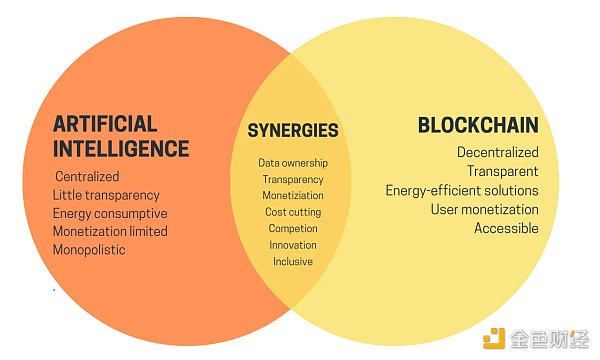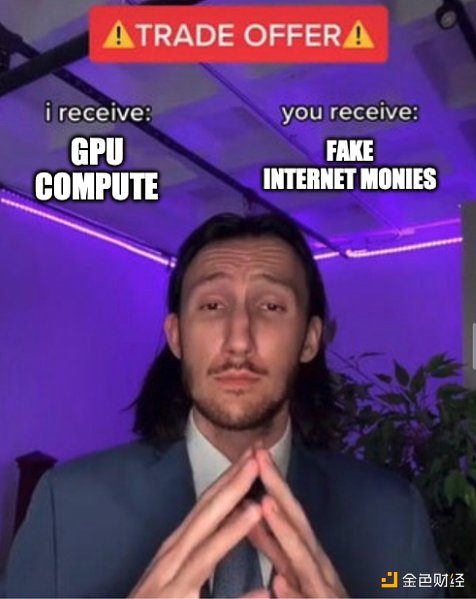Cryptocurrency and artificial intelligence are two of the most exciting technological breakthroughs of our time.
But when you combine the two, things get a lot more interesting.
There is now consensus that Crypto x AI will be one of the hottest topics of this cycle. You can see this already happening — some early investors in AI tokens have seen their bets pay off massively.
But let’s face it: the crypto x AI scene is still pretty new.
Today’s post provides an overview of what’s happening in this emerging industry. We’ll break down the different areas where cryptocurrency and AI intersect and focus on some of the top projects.
Cryptocurrency x AI Overview
Traditionally, AI has been the playground of large corporations. There are several important reasons for this:
- High cost – Developing AI technology requires a lot of computing power. This is not cheap, and usually only tech giants have the financial resources to purchase the necessary hardware, which creates a barrier to entry for smaller entities.
- Data monopoly - AI models require a lot of data to train. Large companies have massive amounts of user data that they can use to create advanced AI models.
Put the two together and you can see why it’s such a huge competitive advantage for large companies.
Think about it: a handful of companies hold most of our data, and they’re all building their own AI technology — Google has Gemini, Twitter is working with Grok, and OpenAI is making waves with ChatGPT.
So how do we level the playing field for the development of AI technology? Through cryptocurrency and blockchain. Decentralization, transparency, and economic incentives are inherent principles of cryptocurrency and blockchain.
Combine these core ideas with AI and you get a whole new game – an AI industry with low barriers to entry that anyone can participate in, creating a fairer ecosystem for the development and use of AI technology.

These synergistic benefits are being applied to different parts of the AI stack. Let’s look at some of these emerging areas:
Distributed Computing
Training an AI model is essentially like building a supercomputer. It's a long and iterative process that uses trial and error and complex math to get the AI model just right. All of this computing is very expensive because it requires specific hardware.
Take OpenAI’s computing requirements, for example. From 2012 to 2018, their computing needs doubled every few months! This is where GPUs come in — they’re specialized hardware with the processing power needed for artificial intelligence.
But GPUs aren’t easy to come by these days. There’s a global chip shortage, and a few big companies like Nvidia and AMD are running the show, with everyone from gamers to AI developers wanting a piece of the action. That makes GPUs very expensive and hard to find.
To address the GPU supply shortage, many projects have adopted the principles of cryptocurrency to align economic incentives between GPU providers and buyers. The idea is to make it easier and cheaper for you to get the computing power you need.

Some of the leading projects that fall into this category include:
- io.net — io.net creates an open marketplace of underutilized GPUs from data centers and cryptocurrency miners, and makes them available to anyone at a fraction of the cost of traditional GPUs.
- Akash — Akash is a decentralized computing marketplace that allows users to buy and sell computing resources securely and efficiently. Anyone can become a provider on Akash and earn revenue by offering their hardware to other users on the platform.
- Render - Render creates a marketplace for idle GPU compute that can be used for different types of projects, such as 3D content creation.
Decentralized AI model training and reasoning
Cryptox AI projects are taking a more open and collaborative approach to building AI technology. These initiatives leverage the decentralized principles of blockchain to enable community-driven AI development.
Imagine an open network where anyone can use computer power to train AI models. This creates a collective intelligence pool available to everyone, paving the way for building a wide range of AI applications.
Some of the leading projects that fall into this category include:
- Bittensor — Bittensor’s mission is to make it easier to build AI applications. They are creating an open peer-to-peer marketplace where anyone can share and leverage machine learning models.
- Gensyn — Gensyn is coordinating “all of the world’s computing into a single network” to build collective intelligence and train AI models at low cost and high scale.
Zero-knowledge machine learning
Because many AI systems, including popular ones like ChatGPT, are closed source, we cannot inspect their workings and determine how certain outputs were derived. This may not matter for a question with an easy-to-fact-check answer, but as capabilities expand and our reliance on these technologies increases, we will need more insight.
Some of the leading projects that fall into this category include:
- Giza — Giza provides a one-stop service for building, managing, and hosting verifiable machine learning models. Its technology stack can be used to build reliable and easy-to-trust blockchain artificial intelligence solutions.
- Modulus Labs — Modulus uses cryptography to verify AI outputs and ensures their accuracy using a specialized zk prover.
To make the whole process more transparent, some crypto x AI projects are turning to zero-knowledge machine learning (zkML). zkML combines sophisticated cryptography with artificial intelligence to ensure the integrity of the machine learning process and the accuracy of its output. It allows us to check the work of artificial intelligence without having to trust anyone, which is what cryptocurrency is all about.
Artificial Intelligence Agent
Developers may be looking to upgrade AI with encryption, but they are also looking to upgrade encryption with AI.
AI agents are essentially intelligent robots that can independently perform tasks across DeFi platforms. They process information, make decisions based on data, and take actions to achieve set goals.
AI agents are now increasingly used in DeFi, serving a variety of use cases such as:
- MEV Arbitrage Bot — Jaredfromsubway.eth specializes in taking advantage of market inefficiencies
- Telegram bots — Unibot and Banana Gun
- Robots in the game - Parallel's Colony, a game where virtual characters driven by artificial intelligence interact with each other
- Bots in social apps - Frenrug, an on-chain AI agent that can chat with users on the app and buy and sell their keys
- Predictive Analytics Robot — Numerai on Bittensor, Subnet 8 (Prediction Subnet)
- AI Agents in Prediction Markets — Omen is a prediction market that uses AI to predict the outcomes of events
AI agents represent an important step in creating autonomous systems that can interact with the DeFi ecosystem to perform a variety of tasks. They are expected to become a unique catalyst for this bull run.
Some of the leading projects that fall into this category include:
- Autonolas — Autonolas provides a framework for developing crypto-native AI agents capable of autonomously executing complex DeFi strategies.
- Morpheus — Morpheus is an open source network designed to power peer-to-peer personal AIs (called Intelligent Agents) incentivized by a native token called “MOR.”
Summarize
The intersection of cryptocurrency and artificial intelligence is more than just a speculative bubble; it’s an emerging field with real implications.
While the hype is undeniable and some projects appear to be jumping on the bandwagon, the fundamental promise of combining cryptocurrency with AI is clear — to create a fairer ecosystem for the development and use of AI technology.
Can a crypto x AI project break into the top ten crypto market cap rankings this cycle?
The potential for cryptocurrency and AI to work together is huge, and we are at an exciting point in this story. As time goes on, we will likely witness a project in this space rise to challenge giants like OpenAI.







